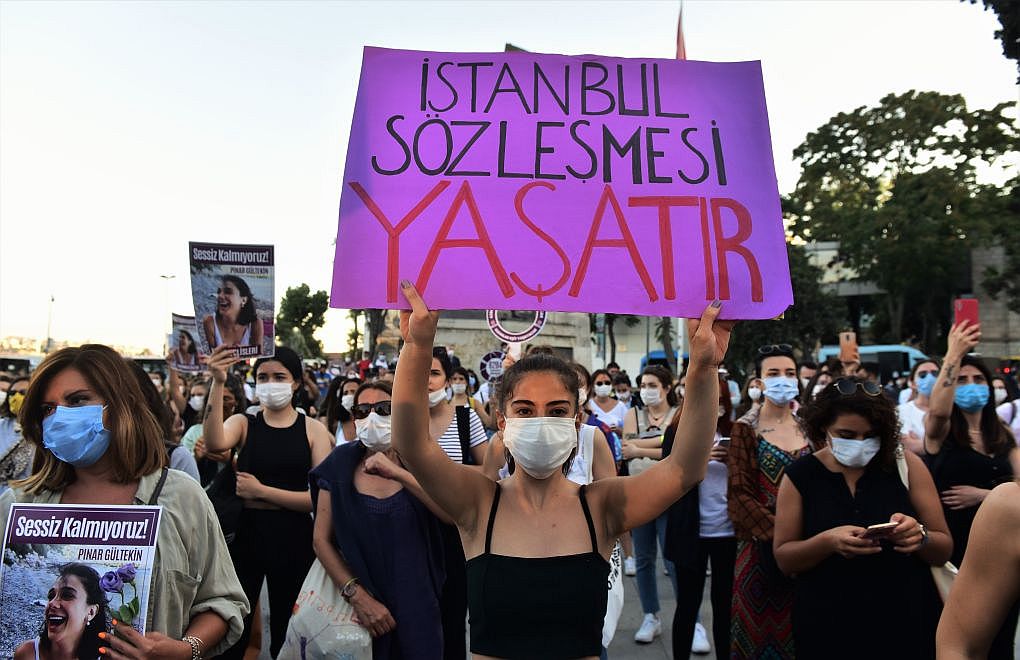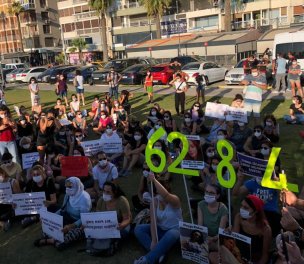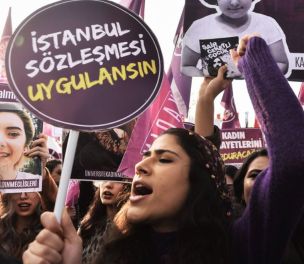* Photo: Zeynep Kuray - "İstanbul Convention keeps one alive"
Click to read the article in Turkish
The results of "August 20 Barometer" of KONDA research company show that only 7 percent of survey participants are in favor of Turkey's withdrawal from the Convention on Preventing and Combating Violence Against Women and Domestic Violence, known as the İstanbul Convention.
This recent survey of KONDA has aimed to estimate the society's support for the convention and to find out whether there has been any social change related to violence against women in the country.
The field work titled "August 20 Barometer" was conducted with the face-to-face participation of 3,559 people in 206 neighborhoods and villages in 110 districts in 32 of 81 provinces in Turkey. While 18 surveys were conducted in each neighborhood, there was also an age and gender quota.
Findings have shown that the last five years have seen positive developments about the approach to women's place in society:
- The rate of those who say, "It is a man, he can love or beat as he wishes" has dropped from 20 percent to 6 percent in five years.
- The rate of those who think that unlawful acts can be committed for honor has dropped from 45 percent to 21 percent.
- The rate of those who say, "Women should be careful about what they wear" has dropped from 80 percent to 32 percent.
Also, only 35 percent of the society know the content of the İstanbul Convention, albeit partly. 62 percent clearly said that they did not. When they were asked about their attitude to the convention, the vast majority of those who knew it said that Turkey should "remain in the convention."
'Political polarization is an important variable'
"There has been a significant change in the mentality of the society about violence against women and honor," KONDA has commented, briefly sharing the following observations based on the survey results:
"The issues pertaining to İstanbul Convention have long been on the agenda due to the substantial increase in feminicides. One cannot possibly fail to see that the above mentioned positive developments are the result of insistent effoers of several institutions and organizations.
"However, we think that such a clear and unprecedented mental change as this needs to be examined from different angles. Because while this change has been witnessed in all demographic profiles, political polarization still plays the role of an important variable in this issue.
'Men unable to accept women's changing role'
"In our opinion, the society of Turkey has gone through a late modernization, then it has entered an hasty modernization process so as to make up for this delay and this modernization has been quite sloppy as there is little faith in the rule of law and common fate.
"While women are having a wider place and weight in daily life in the swifty urbanizing and metropolizing country, they also trigger this mental transformation. It is perhaps safe to suggest that the issues of increasing and visible violence and murder should not be handled as an issue of women, but they should be handled as an issue of men who are unable to come to terms with the changing role and weight of women.
'Half of society don't know what is discussed'
"When we add the ones who know about the content and make a comment accordingly, 54 out of every 100 people in the country do not know the content of the convention and do not have an idea as to whether Turkey should remain in the convention or not. The majority of those who have an idea think that Turkey should remain in the İstanbul Convention.
"In other words, the recently increasing number of feminicides, the media's reporting about this issue, social media posts and objections about the convention might give the impression that this issue is being debated by wider segments of the society, but half of the society do not really have an idea of what is being discussed."
* Click here for the full report
About İstanbul Convention
* Source: CoE The Council of Europe (CoE) "Convention on Preventing and Combating Violence Against Women and Domestic Violence", also known as "İstanbul Convention", is based on the understanding that violence against women is a form of gender-based violence that is committed against women because they are women. It is the obligation of the state to fully address it in all its forms and to take measures to prevent violence against women, protect its victims and prosecute the perpetrators. As of March 2019, it has been signed by 45 countries and the European Union (EU). On March 12, 2012, Turkey became the first country to ratify the Convention, followed by 33 other countries from 2013 to 2019 (Albania, Andorra, Austria, Belgium, Bosnia and Herzegovina, Croatia, Cyprus, Denmark, Finland, Estonia, France, Georgia, Germany, Greece, Iceland, Ireland, Italy, Luxembourg, Malta, Monaco, Montenegro, the Netherlands, Norway, North Macedonia, Poland, Romania, Portugal, San Marino, Serbia, Slovenia, Spain, Sweden, Switzerland). The Convention came into force on 1 August 2014. * Click here to read the full convention |
From İstanbul ConventionThe purposes, definitions and general obligations of the İstanbul Convention have been indicated in its first chapter of the as follows: Chapter I – Purposes, definitions, equality and non-discrimination, general obligations Article 1 – Purposes of the Convention The purposes of this Convention are to: a) protect women against all forms of violence, and prevent, prosecute and eliminate violence against women and domestic violence; b) contribute to the elimination of all forms of discrimination against women and promote substantive equality between women and men, including by empowering women; c) design a comprehensive framework, policies and measures for the protection of and assistance to all victims of violence against women and domestic violence; d) promote international co-operation with a view to eliminating violence against women and domestic violence; e) provide support and assistance to organisations and law enforcement agencies to effectively co-operate in order to adopt an integrated approach to eliminating violence against women and domestic violence. In order to ensure effective implementation of its provisions by the Parties, this Convention establishes a specific monitoring mechanism. Article 2 – Scope of the Convention This Convention shall apply to all forms of violence against women, including domestic violence, which affects women disproportionately. Parties are encouraged to apply this Convention to all victims of domestic violence. Parties shall pay particular attention to women victims of gender-based violence in implementing the provisions of this Convention. This Convention shall apply in times of peace and in situations of armed conflict. Article 3 – Definitions For the purpose of this Convention: a) "violence against women" is understood as a violation of human rights and a form of discrimination against women and shall mean all acts of gender-based violence that result in, or are likely to result in, physical, sexual, psychological or economic harm or suffering to women, including threats of such acts, coercion or arbitrary deprivation of liberty, whether occurring in public or in private life; b) "domestic violence" shall mean all acts of physical, sexual, psychological or economic violence that occur within the family or domestic unit or between former or current spouses or partners, whether or not the perpetrator shares or has shared the same residence with the victim; c) "gender" shall mean the socially constructed roles, behaviours, activities and attributes that a given society considers appropriate for women and men; d) "gender-based violence against women" shall mean violence that is directed against a woman because she is a woman or that affects women disproportionately; e) "victim" shall mean any natural person who is subject to the conduct specified in points a and b; f) "women" includes girls under the age of 18. Article 4 – Fundamental rights, equality and non-discrimination Parties shall take the necessary legislative and other measures to promote and protect the right for everyone, particularly women, to live free from violence in both the public and the private sphere. Parties condemn all forms of discrimination against women and take, without delay, the necessary legislative and other measures to prevent it, in particular by: –embodying in their national constitutions or other appropriate legislation the principle of equality between women and men and ensuring the practical realisation of this principle; –prohibiting discrimination against women, including through the use of sanctions, where appropriate; –abolishing laws and practices which discriminate against women. The implementation of the provisions of this Convention by the Parties, in particular measures to protect the rights of victims, shall be secured without discrimination on any ground such as sex, gender, race, colour, language, religion, political or other opinion, national or social origin, association with a national minority, property, birth, sexual orientation, gender identity, age, state of health, disability, marital status, migrant or refugee status, or other status. Special measures that are necessary to prevent and protect women from gender-based violence shall not be considered discrimination under the terms of this Convention. Article 5 – State obligations and due diligence Parties shall refrain from engaging in any act of violence against women and ensure that State authorities, officials, agents, institutions and other actors acting on behalf of the State act in conformity with this obligation. Parties shall take the necessary legislative and other measures to exercise due diligence to prevent, investigate, punish and provide reparation for acts of violence covered by the scope of this Convention that are perpetrated by non-State actors. Article 6 – Gender-sensitive policies Parties shall undertake to include a gender perspective in the implementation and evaluation of the impact of the provisions of this Convention and to promote and effectively implement policies of equality between women and men and the empowerment of women. |
(AÖ/SD)











